LOST 005 - Now You And I Are The Same
♫♪Mama, I killed a man. Hit his head until it broke, facedown river now he’s smoke.

Note: this essay was originally published on Revue on February 5, 2022.
LOST times, my friendlies. By now you know the deal. If not, read here.
Last time we reviewed the first half of “Across The Sea,” LOST’s baffling and entrancing Rosetta stone of an episode. Now we finish it up. Let’s make like LOST’s Season 6 writers at the very end, and push far too much water through pipes that are far too narrow for the volume.
Quickcap! See my fingers fly across the keys!
O B S E R V A T I O N
Years have clearly gone by. Jacob’s now the adult fellow (played by Mark Pellegrino) we’ve grown to know and watch. Looming at Mother’s loom, he seeks her approval for what appears to be pretty shoddy work, and gets the halfhearted response he deserves. She claims to be tired. Personally, after decades of living with Jacob, I’d say that’s understandable.
Next we see Jacob at the human camp. Brother is there, all growns-up himself, played by the already familiar Titus Welliver. So, both brothers are now in the physical forms we know they will someday have as some sort of immortal beings.
Brother and Jacob play the game they played together as youths in simpler days. Brother asks why Jacob visits. Jacob says he wants to see if Mother is right about people.
This exchange follows:
Brother: You want to know if they’re bad. That woman may be insane, but she’s definitely right about that.
Jacob: I don’t know. They don’t seem so bad to me.
Brother: Well, that’s easy for you to say, looking down on us from above. Trust me. I’ve lived among them for 30 years. They’re greedy, manipulative, untrustworthy, and selfish.
Jacob: Then why are you with them?
Brother: They’re a means to an end.
Brother reveals what “end” he means: he’s getting off the island. His people—some of whom are quite ingenious—have discovered pockets of electromagnetism all over the island. (This being old times, he doesn’t say “pockets of electromagnetism,” but rather “places where metal behaves strangely,” and demonstrates this in dramatic fashion by throwing his knife, which curves through the air to stick to the stones of a nearby well. Since I haven’t mentioned the pockets of electromagnetism before, it’s worth noting they have been a major plot point/mystery throughout the narrative.)
They find the pockets. They dig. And here, at this site, they found something extraordinary.
Brother pleads with Jacob to come with him off the island. He asks what Jacob intends to do when Mother dies. Jacob insists Mother will never die. Brother tells Jacob that everything dies. It’s actually possible that Jacob doesn’t know this.
Jacob is upset, almost in the manner of a child.
Jacob: I don’t want to leave the island. It’s my home.
Brother: Well it’s not mine.
Later, Mother, who seems perfectly aware of the encounter, asks what Brother told him. Jacob, being Jacob, immediately snitches on Brother yet again.
Mother does not seem happy that Brother is planning to leave the island. She visits the human encampment and, watching from a distance, confirms that Brother’s story is true. They’ve got a hole in one of the special spots.
We then cut to Brother at the bottom of this hole, burning some rocks.¹ There’s a ladder leading up. I want to just note that, though Mother now appears behind him, we do not see her climbing down the ladder. Maybe she does. Maybe she doesn’t. Seems like she’s just there. We see the ladder, then the camera pushes in past it to focus on Brother, and there Mother is. I’m noting this because there is an entity we’ve seen throughout the LOST narrative who just appears in places.
For the first time in three decades, Brother and Mother talk.
Brother confirms that he’s become the sort of person Mother warned about. He’s been seeking the light. He’s spent his life searching for the Robert Kincave, never coming close to discovering it. So—curious and ingenious man he is—he decided to dig.
Mother: The people who are with you have seen it, too?
Brother: Yes. They have some very interesting ideas about what to do with it.
He levers back a stone in the wall beside which he’s standing, and out pours the light. Light for all! Get your light! Light here!
The light reveals an object we viewers have seen before: a huge wooden wheel.
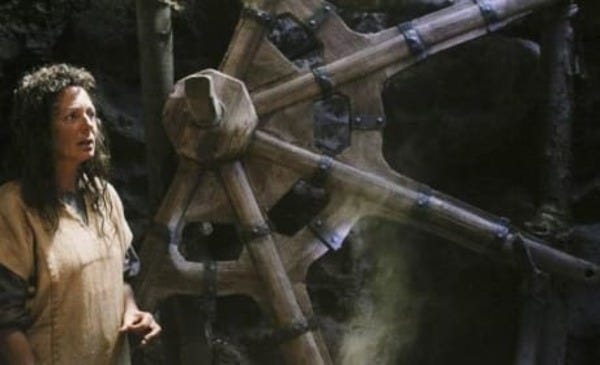
Mother: What is that?
Brother: It’s a wheel. We’re going to make an opening—one much bigger than this one. And we’re going to attach that wheel to a system we’re building. A system that channels the water and the light. And then I’m going to turn it. And when I do … I’ll finally be able to leave this place.
Mother: How do you know all this? How do you know it’ll work?
Brother: Because I’m special, Mother.
Having thrown her words back in her face, Brother fatally lets his guard down. There’s a bit of pleading on Mother’s part to not do this, and a bit of insisting that he has no choice because he doesn’t belong here on Brother’s part. Then Mother grabs Brother by the head and bashes his skull against the bricks. In her defense, she says she’s sorry first, and she does seem to even be sorry. But she bashes him good.
Anyway, Brother’s out cold.
Night. Mother wakes Jacob and tells him It’s Time. Leading Jacob through the woods, she tells Jacob that Brother is leaving and she doesn’t have any choice but to let him go. She brings Jacob to the Robert Kincave.
This is going to be important stuff, so I’m going to transcribe most of it.
Jacob: What’s down there?
Mother: Life. Death. Rebirth. It’s the source. The heart of the island. Just promise me … no matter what you do … you won’t ever go down there.
Jacob: Would I die?
Mother: It would be worse than dying, Jacob. Much worse.
She pours some wine and does some ceremonial chanting in Latin.
Mother: Here. Drink this.
Jacob: What happens if I do?
Mother: You accept the responsibility that you’ll protect this place for as long as you can. And then you’ll have to find your replacement.
Jacob: I don’t want to protect this place.
Mother: Someone has to.
Jacob: I don’t care.
Mother: My time is over.
Jacob. Why? Why is your time over?
Mother: It has to be you, Jacob.
Jacob: No it doesn’t. You wanted it to be him. But now I’m all you have.
Mother: It was always supposed to be you, Jacob.
Jacob is emotional almost in the way of children throughout this scene. Finally, told he doesn’t really have a choice, he takes the cup and drinks.
Mother says this strange and rather specific thing:
Now you and I are the same.
Day (maybe earlier that day, maybe the next day): Brother wakes up, he’s outside in the jungle. The entire camp has been destroyed. The structures are all on fire. All the people are dead. Trees have been torn up. And the entire enormous cave of the dig has been filled up to the top with large rocks. Somebody has done all this. We didn’t see who. We’ve seen only one somebody who can do this sort of damage, however—though we’ve not seen it yet in this episode.
Anyway, faced with the death of his only hope and the destruction of his life’s work, Brother acquires the crazy eyes and the murder rage.
Elsewhere in the island, Mother sends Jacob off on an errand—firewood, ahead of a storm that threatens to come but which (I’ll note) never actually arrives.
Mother goes home. Her loom has been smashed. Brother’s ancient game is there. White stone and black.
Brother creeps from the shadows with his fancy stabbing knife and stabs her in some of her most important living places.
Mother says “thank you” and dies.
Jacob returns and sees Brother standing over Mother’s corpse. In an exact recapitulation of a scene from their boyhood, Jacob brutally attacks Brother, while Brother seems incapable of retaliating.
Enraged, Jacob drags Brother to the Robert Kincave, and throws him into the river leading in, sending him to what he has been assured is a fate much worse than death.
Brother hits his head on the way and floats in, face down.
Moments later, the earth rumbles and the black smoke explodes from the opening.
Jacob, confused, wanders downriver. There he finds the body of Brother, dead. That night, Jacob burns the bodies along with the game. Black stone and white stone.
A thousand years later, during Season 1 of LOST, Jack and Kate find the bodies and the stones. We’ll talk about that scene when we get there.
And there we go.
Holy crap! What did we just see?
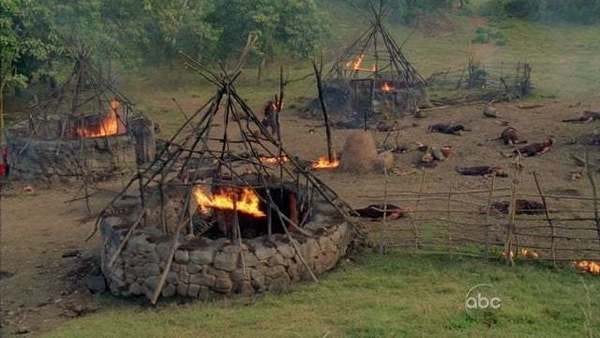
Let’s run the voodoo down.
1. Remember, it’s been established that the central engine of all this drama is an argument between two godlike entities: The Adversary, which believes that human beings are unredeemable, and which we’ve previously seen incarnated in the person of Brother, among others, and also as black smoke; and The Island, which has dominion over The Adversary, which believes that human beings are redeemable, and who we’ve previously seen incarnated in the person of Jacob.
The Island brings people to the island in order to prove its point to The Adversary, but it refuses to get involved, least the experiment be tainted, preferring instead to keep entirely isolated or to work through intermediaries. The Adversary has no problem tainting the experiment, and interferes like crazy.
This might suggest something about how the Island thinks about The Adversary, when it comes to its place within the experiment. I’ll come back around on that one someday.
2. From this I will simply observe that: a) these godlike beings demonstrate that they incarnate as people; b) these consciousness can be transferred from one human to another; and c) those people appear to maintain the human qualities they had when they were merely people, even while they seem to wield godlike abilities and be inhabited by godlike consciousnesses.
They seem to actually still be fully human while being fully gods, in other words. It’s not “now you are like me.” It’s “now we are the same.”
Transferring from one person to another isn’t like changing your clothes to these entities. It’s a dramatic change in the type of godlike entity you’re going to be.
So what people they find themselves incarnating as informs how they will be able to operate. It matters.
This, I think, is the key to understanding what Mother is up to.
3. Mother very clearly possesses qualities of both entities. One is overtly shown: she is part of what appears to be a lineage of island protectors, a lineage she passes to Jacob. She claims to have the ability to constrain behavior, and there is some evidence that she possesses it.
Additionally, I am not sure how else we are expected to understand the massive devastation that occurred to Brother’s dig and the human camp other than as an attack of the black smoke. She claims first-hand knowledge of what the light is like down in the cave, and claims to know the experience is worse than death. And we clearly see that going down into the cave to the light bonds your consciousness with the black smoke—an experience we’ve heard Brother describe as Jacob “robbing me of my humanity.” There is the way that Mother is preternaturally aware of what is happening on the island—a capability she shares with the smoke. There are also the same hints here that have popped up elsewhere that the black smoke/Adversary has some measure of control over the weather … though I haven’t really unpacked that, so we’ll leave it be for now.
Hopefully I’ve been convincing. I think it’s reasonable to assume that, just as the role of island protector is a lineage, so is the role of the black smoke. Or perhaps the smoke has always been the body of the Protector until now.
In any case, the Mother we’re shown is a triumvirate: The human we call Mother and the Protector and the Smoke, the woman we call Mother and The Island and The Adversary. It’s not said, but it’s shown clearly enough that I’m putting this statement in Observation, not Belief.
4. Mother is up to many things. We can tell she is scheming. She never comes right out and says what her scheme is, though. However, we can see what she does.
She bashes in the head of Claudia after she sees that Claudia has given birth to two children, not one.
She drives away the child she prefers, who is brighter, more ingenious, more determined, more deceptive but more strategic and level-headed, sending him to live among people, where he learns that people are as evil as she says, and where he also learns many things about how to escape the island.
She keeps close to herself the one who is less capable, less curious, less intelligent, more loyal but more volatile, and gives him the sacred trust of protecting the island.
She seems to manipulate the events surrounding both her own death and Brother’s, the first by destroying Brother’s hopes beyond endurance, the latter by arranging matters so that Jacob will return to find the evidence, and (we suspect on available evidence) by manipulating reality so that Brother cannot hurt Jacob.
She seems very grateful to die.
5. It’s worth noting that we’ve seen, many episodes ago, that Brother’s wheel eventually gets built, and it works. It will carry a person off the island. It can also do very strange things to the island’s relative location within time and space. Much more on this soon.
For now, let’s note that it means that The Adversary, in the incarnation of Brother, will continue Brother’s work. Which would suggest that, while The Adversary’s consciousness is a continuance, for as long as it incarnates as Brother, it very much remains Brother, too.
Brother is somebody who will always use any scientists who come to the island in order to try to manipulate the water and the light. This might be a good piece of information to tuck away, in case we notice this sort of thing happening during the narrative.
6. Let’s note that in this episode, the light at the heart of the island is established as life and death and rebirth, also as the source of human souls, and it’s also established that the entity known as the Adversary is intrinsically tied to it.
Also, while The Adversary is able to take a corporeal form when incarnating as Brother, that physical body itself is clearly a separate thing from Brother’s actual body, which died and becomes a skeleton.
Just hold onto those ideas for a while. We might use them someday.
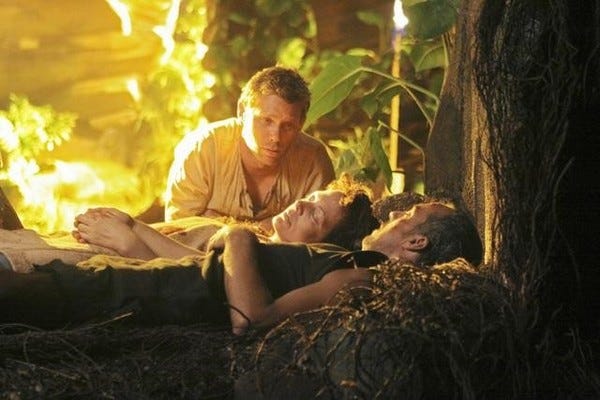
B E L I E F
These are the conclusions I believe fit the observations we’ve made:
1) I believe that what we see in this episode is the end of one great epoch in this long cycle of argument between The Island and The Entity, and the beginning of a new epoch.
I believe the entirety of the actual LOST narrative—the TV show we all watch and hopefully enjoy—chronicles the events that will end the epoch we see born in this episode, and will conclude with the start of a yet another epoch.
I believe that the epoch we see end in this episode is one in which the argument between the two raged within the person of a single human—Mother.
I believe the Island, whose real body is the light at the heart of the physical island, tried to show the Adversary, whose real body is the smoke, that humans were worthy, not just by bringing humans, but by making the Adversary become a human.
I believe that the human who is Mother and the entity known as The Adversary found this situation intolerable, and conspired with the part of herself that is The Adversary to free themselves from it.
I think the appearance of twins—an eventuality that becomes inevitable given a steady supply of people and an immortal life—made this plan possible.
2) I believe Mother’s scheme was to split the triumvirate—to send the lineage of the Protector, and its communion with the Island’s consciousness, to one twin, and the consciousness of The Adversary, along with all The Adversary’s strength and powers.
And thus the new epoch begins: one in which the two viewpoints incarnate in the personages of two different humans.
3) I believe that Mother deliberately groomed the smarter and more capable brother for The Adversary’s incarnation, while deliberately grooming the less capable and less clever one for The Island’s incarnation. Deliberately, because the plan was to create a new scenario that disproportionately advantaged The Adversary.
This is a thing that was very hard to catch as a viewer on the first and even the second view, because we’ve spent the entire run of the show hearing about and waiting for the arrival of this great and all-powerful Jacob, spoken of in hints and guesses … and then he arrives, and the reality of him is underwhelming. Disappointing. Mark Pellegrino² plays him as peevish, mercurial, almost foolish, and frequently unlikeable. It’s jarring. It feels like a mistake.
I believe it’s on purpose.
The Island is playing a game with The Adversary, and naming the rules.³
The Adversary is trying to rig that game by picking sides. It gets to be Brother. The Island will have to choose whoever’s left.
4) We’ll eventually see that the black smoke isn’t physically killable absent certain very specific circumstances. I believe that Mother wasn’t physically killable until passing on the lineage of Protector to Jacob, and knew it. I believe she also knew that if Jacob had then descended to the light, he would have completed the triumvirate, and Mother knew that, too—which was why she made such a point of warning him away from it, and then arranged matters so that Jacob would cast Brother into it.
This also explains her urgency. If Brother was truly about to escape the island—and he was—she needed to stop it in a way that would make Brother want to murder her. She wanted Brother to kill her, so she needed to become killable, and she wanted Jacob to be mad enough about it to cast Brother into the Kincave in one of his rather typical rages.
It all had to happen at once.
And it did.
The Adversary was triumphant. It became the person who already believed humans were evil, armed with the knowledge and the will to destroy the island forever and free the Adversary from this intolerable existence, while as defender against this foe, The Island was going to have to rely on that indifferent dummy, Jacob.
5) Unfortunately for The Adversary, I believe Mother didn’t realize the role of Protector doesn’t just involve communion with the Island’s consciousness, but also bestows the Island’s dominion over The Adversary.
Which meant Jacob was able to establish some rules.
Stalemate.
6) You might wonder why The Island allowed all this, if it was also fully incarnating in the person of Mother. If we’re meant to understand The Island as all-powerful, however did Mother and The Adversary keep all this secret from The Island?
The simple answer is, they didn’t. The Island, unwilling to foul the experiment, allowed it all to happen. I believe The Island, unperturbed, probably found this to be a very interesting outcome.
Because it only ends once, and anything that happens before that is just progress.
Let’s start talking about the nature of the experiment next time, shall we?
L O S T
NEXT TIME: See You In Another Life, Brotha
____
¹ Look, I don’t know what to tell you. That’s what he’s doing. He’s burning some rocks.
² Even the casting seems a giveaway. Up to this point, Pellegrino had mostly made his chops playing, for want of a better word, dumbasses. He was the nihilist who pissed on Lebowski’s rug. He was the fuckup of a hit-man that Naomi Watts hires in Mulholland Drive. He wasn’t famous enough to really have a persona, but he certainly played a type.
³ Back in Ab Aertno, you may recall, Jacob passes a white stone to Brother through Ricardo as a sort of message. We can now read this as a call-back to the game they used to play with one another, and a bit of a taunt: I set the rules now. So, that’s that little piece of cryptic business explained.
_____
A.R. Moxon is the author of The Revisionaries, which is available in most of the usual places, and some of the unusual places. He was born in a desert, raised in a lion’s den.

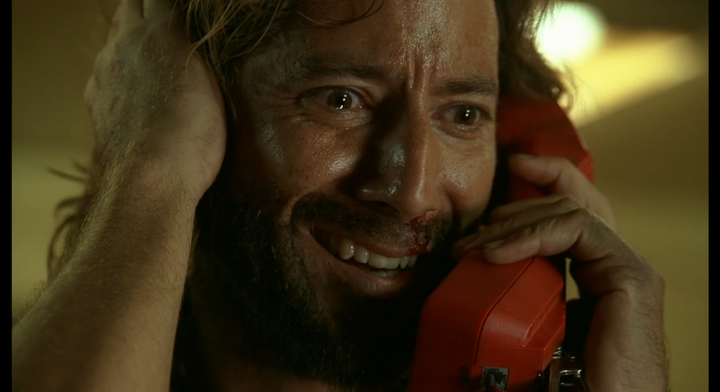

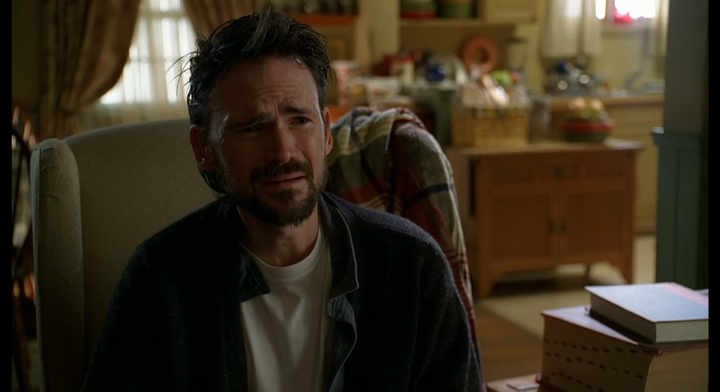
Comments ()